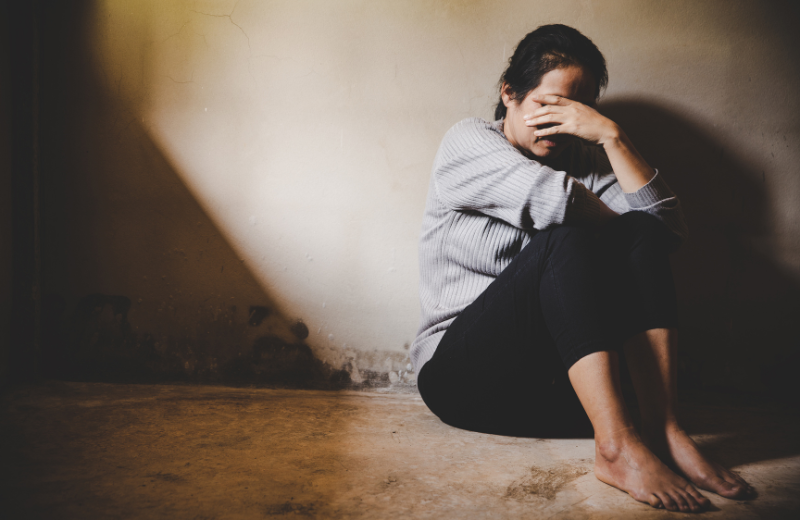Childhood trauma can leave deep scars that affect many aspects of adult life. Understanding how to heal from traumatic childhood experiences is essential for anyone looking to lead a fulfilling and healthy life. In this blog post, we'll explore practical steps and strategies to help you overcome childhood trauma. We'll cover what childhood trauma is, its long-term effects, and how you can begin your journey towards healing.
Jump to:
What is Childhood Trauma?
Childhood trauma refers to any event or series of events that significantly disrupt a child's sense of safety and security. These events can range from physical, emotional, or sexual abuse to neglect, witnessing violence, or experiencing a severe accident or illness. The definition of childhood trauma includes both acute incidents and chronic situations, such as ongoing neglect or bullying.
Recommended for you!
Best SellersDo You Ever Fully Heal From Childhood Trauma?
Healing from childhood trauma is possible, but it is often an ongoing process. Many people experience significant improvements in their well-being and quality of life, though some effects of trauma may persist.
Long-Term Effects of Childhood Trauma
The impact of childhood trauma can persist into adulthood, affecting mental health, relationships, and overall well-being. Common long-term effects include:
- Emotional Regulation Issues: Difficulty managing emotions, leading to anxiety, depression, or anger. Adults who have experienced childhood trauma may find it challenging to cope with stress and can often feel overwhelmed by their emotions.
- Relationship Problems: Struggles with trust, intimacy, and maintaining healthy relationships. People may have difficulty forming close bonds, leading to feelings of isolation and loneliness. This can result in patterns of dysfunctional relationships.
- Physical Health Issues: Increased risk of chronic illnesses like heart disease and diabetes. The prolonged stress from childhood trauma can weaken the immune system, making people more susceptible to various health problems.
- Self-Esteem Issues: Persistent feelings of worthlessness or inadequacy. This can manifest as a lack of confidence in personal and professional settings, often leading to missed opportunities and unfulfilled potential.

- Substance Abuse: A higher likelihood of turning to alcohol, drugs, or other substances as a coping mechanism. This can lead to addiction and further complicate mental and physical health issues.
- Cognitive Difficulties: Problems with concentration, memory, and decision-making. Childhood trauma can affect brain development, resulting in cognitive impairments that impact daily functioning and academic or professional performance.
- Sleep Disturbances: Chronic insomnia, nightmares, or other sleep disorders. These issues can contribute to ongoing fatigue and intensify mental health problems like anxiety and depression.
- Hypervigilance: A heightened state of alertness, often leading to anxiety and an inability to relax. This constant state of readiness can be exhausting and interfere with daily life and relationships.
- Attachment Disorders: Difficulty forming healthy attachments with others. This can result in a range of issues, from extreme dependency to an inability to connect emotionally with others.
- Somatic Symptoms: Physical symptoms with no apparent medical cause, such as headaches, stomachaches, or chronic pain. These symptoms can be a manifestation of unresolved trauma.
- Behavioural Issues: Engaging in risky or self-destructive behaviours. This can include aggression, delinquency, or promiscuity as ways to cope with or express unresolved trauma.
- Dissociation: A disconnection from reality, which can range from mild detachment to severe dissociative disorders. This can make it difficult to stay present and engaged in daily activities.
- Academic and Career Challenges: Underachievement or difficulties in school and work. Trauma can affect the ability to focus, stay motivated, and pursue long-term goals, often resulting in a lower quality of life.
- Chronic Stress: Ongoing stress that affects overall well-being and health. This can lead to burnout, anxiety disorders, and other stress-related conditions.
- Trust Issues: Difficulty trusting others, which can hinder personal and professional relationships. Trust issues can make it hard to form meaningful connections and lead to feelings of isolation.
- Social Withdrawal: A tendency to withdraw from social interactions and activities. This can result in loneliness and exacerbate mental health issues.
What Happens if You Ignore Childhood Trauma?
Ignoring childhood trauma can lead to a range of issues, including chronic mental and physical health problems, relationship difficulties, substance abuse, and overall reduced quality of life.
How to Heal from Traumatic Childhood Experiences

Luckily, healing from childhood trauma is possible. Healing involves a combination of self-help strategies, professional support, and patience. Here are some key steps to help you on your path to recovery:
1. Acknowledge Your Trauma
The first step in overcoming childhood trauma is acknowledging that it exists. Denial or minimising the impact of traumatic experiences can prevent healing. Reflect on your past and recognise the events that have shaped your emotional and psychological state.
2. Seek Professional Help
Therapy is a powerful tool for healing from childhood trauma. Different therapies can help, such as:
- Cognitive-Behavioural Therapy (CBT): Helps reframe negative thought patterns.
- Eye Movement Desensitisation and Reprocessing (EMDR): Effective for processing traumatic memories.
- Psychodynamic Therapy: Explores the deep-seated origins of trauma.
3. Build a Support System
Surrounding yourself with supportive friends and family is essential. A strong support system can provide emotional comfort and practical assistance as you navigate your healing journey. Joining support groups, either in-person or online, can also be beneficial.
4. Practice Self-Care
Taking care of your physical and mental health is essential. Self-care practices might include:
- Exercise: Regular physical activity can reduce stress and improve mood.
- Mindfulness and Meditation: Techniques that help you stay present and manage stress.
- Healthy Eating: A balanced diet can positively impact your overall well-being.
5. Educate Yourself
Learning about childhood trauma and its effects can empower you. Books on childhood trauma, such as "The Body Keeps the Score" by Bessel van der Kolk, provide valuable insights. Understanding trauma responses can help you feel more in control of your healing process.
6. Set Boundaries
Establishing healthy boundaries is essential for protecting yourself from further harm. This includes learning to say no and distancing yourself from toxic relationships or environments. Boundaries help create a safe space for healing.
7. Develop Coping Strategies
Developing effective coping strategies can help manage stress and emotional pain. Techniques such as deep breathing, journaling, and creative outlets like art or music can be therapeutic.
8. Be Patient with Yourself
Healing from childhood trauma is not a linear process. There will be setbacks and difficult days, but it's important to remain patient and compassionate with yourself. Celebrate small victories and progress along the way.
Frequently Asked Questions About Overcoming Childhood Trauma

How do I know I had childhood trauma?
Signs that you may have experienced childhood trauma include persistent emotional difficulties, relationship problems, physical symptoms without a medical cause, behavioural issues, and recurring memories or flashbacks of distressing events. Reflecting on your past and discussing your experiences with a therapist can help clarify whether you have experienced trauma.
What does unhealed childhood trauma manifest as?
Unhealed childhood trauma can manifest as anxiety, depression, relationship difficulties, low self-esteem, chronic physical ailments, substance abuse, behavioural problems, and cognitive challenges.
Where is childhood trauma stored in the body?
Childhood trauma can be stored in the body in various ways, often manifesting as chronic tension, pain, and stress-related illnesses. Techniques like somatic experiencing aim to address and release trauma stored in the body.
What mental illness is caused by childhood trauma?
Childhood trauma can contribute to the development of various mental health disorders, including PTSD, depression, anxiety disorders, borderline personality disorder, and dissociative disorders.
Why is childhood trauma so hard to overcome?
Childhood trauma is difficult to overcome because it often disrupts fundamental aspects of development, affecting emotional regulation, self-perception, and interpersonal relationships. Additionally, trauma can become deeply ingrained in the mind and body, requiring comprehensive and sustained efforts to heal.
How do I know if I was neglected as a child?
Signs of childhood neglect include difficulties trusting others, low self-esteem, a sense of emptiness, difficulties with emotional regulation, and problems forming healthy relationships. Reflecting on your upbringing and discussing your experiences with a therapist can provide more clarity.
At what age is trauma most impactful?
Trauma can be impactful at any age, but experiences during early childhood (ages 0-6) are often most profound due to the critical stages of emotional and psychological development occurring during this period.
Does childhood trauma get worse as you get older?
Childhood trauma can have cumulative effects, leading to worsening symptoms if left unaddressed. However, with proper treatment and support, it is possible to mitigate and manage these effects.
How do I release trauma from my body?
Releasing trauma from the body can involve practices such as somatic experiencing, yoga, mindfulness, and other body-focused therapies that help process and release stored tension and stress.
Do people remember childhood trauma?
Your memory of childhood trauma can vary; some people have vivid recollections, while others may have repressed memories. Triggers or therapy can sometimes bring repressed memories to the surface.
How does childhood trauma affect personality?
Childhood trauma can impact personality by influencing emotional regulation, self-esteem, interpersonal relationships, and coping mechanisms. It can lead to traits such as heightened anxiety, trust issues, and difficulty forming attachments.
What can trigger childhood trauma?
Triggers for childhood trauma can include reminders of the traumatic event, such as specific places, people, smells, sounds, or situations that evoke the memory of the trauma.
Recommended for you!
Best SellersStudy PTSD Awareness for £29
If you're struggling with the long-term effects of childhood trauma, know that help is available. At Centre of Excellence, we offer a PTSD Awareness Course designed to provide you with the knowledge and tools to understand and heal from trauma. For a limited time, you can enrol in this course at a discounted price of £29.













